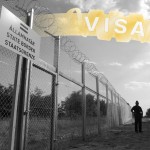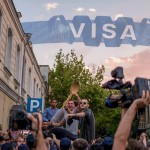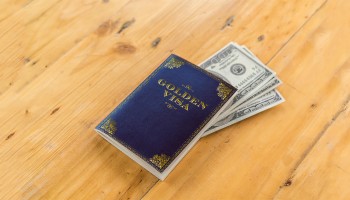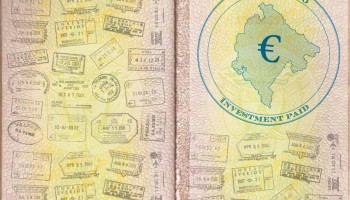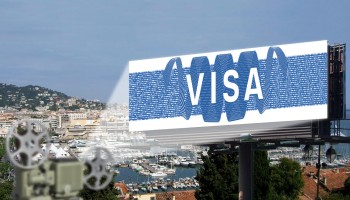Last fall, a German television crew covered the glittering Global Citizens Forum on Montenegro’s Sveti Stefan islet. The annual event, which is sponsored by Arton Capital, celebrates the benefits of Golden Visas, a perk enjoyed primarily by the top 1 percent of the global elite.
These programs, which are in effect in some 20 countries, allow wealthy people to buy their way into citizenship.
In Montenegro, the German journalists, working in conjunction with OCCRP, interviewed guests and government officials -- including entrepreneur Romy Hawatt, who was born in Australia but now considers himself a global citizen with a special connection to Montenegro.
A lightly edited transcript of the interview follows the video.

What is global citizenship all about?
Well, goods and services move freely around the world, or largely freely around the world in 2017, and so why shouldn't people as well? I don't think people should be bound by the shackles of the place that they are born in. Many people, most people, in fact all people are immigrants. We all started in Africa and at some point in our histories we migrated. So, what is wrong with the concept of migration? What is wrong with the concept of people having multiple nationalities and living in multiple places?
So where do you live?
I was born in Australia, but I have lived around the world. I have lived in Japan, I have lived in the United States, I've lived in Europe, in Germany in fact, in Munich for four years. I currently live in Dubai, or mainly in Dubai, and travel between Dubai, Montenegro and London.
And which citizenships do you hold?
I hold an Australian citizenship from birth, I hold a Lebanese citizenship from heritage and I hold a Montenegrin citizenship from investment.
Ok, so the Montenegro program is already working?
It is not fully working. It is not officially working, in the sense that it's not available to all people. There are special circumstances where they will provide citizenship, and I guess I qualified for that, given the level of investment that I’ve made in this country.
What did you invest in?
Well, as you can see behind us, in aviation: helicopters, scenic and charter; and also airplanes, scenic and charter. But we also have pilot training facilities where we train pilots to learn to fly, basically from start all the way to air transport pilot licenses. And we also have a destination management company, Discover Montenegro, that we operate from here…
How did you pick Montenegro as a destination? Did you consider different places? And that was an attractive program?
Being a citizen of the world, I have travelled to and lived in many places, in fact I stopped counting at about 20 million air miles about five years ago … once you reach that kind of number it becomes ridiculous. I have had exposure to many different countries, many different locations and here, Montenegro, it’s kind of the next new thing: You are right in the center of Europe, within a thousand-mile radius of the world's most affluent people … Geographically it is much more attractive than the north, weather-wise for example. You know you have got Italy just across the water, you are surrounded by Serbia, Bosnia, Croatia...
...and if you have personal aviation it’s not that far...
...The distance in miles is not that far, but the territory is quite mountainous, so a helicopter is really a good way to go.
Do you fly all the time by yourself?
Sure, I use it. I have many aircraft, I have about 50 aircraft in the fleet … I think probably about 14 helicopters, positioned in Australia mainly, but also this one here that you see behind us, but we also have fixed wing aircraft training and scenic and charter.
And is aviation also your original affiliation or how did you make your money?
(laughs) Through a lot of hard work and many years of blood and sweat and tears. Getting knocked down and getting up again...
...as an entrepreneur...
...yes, I'm an entrepreneur and I've invested heavily in real estate over the years, I have quite a diverse portfolio of real estate, all kinds of international trade, import and export over the years. I was involved with a very large digital media education business which has many branches in Germany, a group called SAE Institute which I was able to join some years ago and help build up unto a point where we sold it about five or six years ago now.
And I had a passion for flying. I have flown gliders since I was in my teens, I have always wanted to fly helicopters and when I could afford it and had the time, I took it up, took the license and I use it as a mode of transport.
And the yacht here...
…Yeah, that's Riana...
...and that's yours?
Yeah, that's my yacht.
And you provided it (to the expo) as a favor?
Yes, supporting [Arton Capital CEO] Armand Arton. I believe in what they are doing. You know, it's a shrinking world in many ways. Global citizenship, in terms of taking on second citizenship or investing in second citizenship, I believe, is part of an overall strategy. It's not just buying a passport, it is investing into a country, setting up a home, setting up business, setting up investments in that country and making it literally a place that you do call home, not just a place that you take a citizenship and don't visit.
As you mentioned the term “buying a passport” - there are critics who say this is only for wealthy people and if you promote freedom of movement here at the Global Citizen Forum, how does that fit the picture if you see that poor people cannot afford this?
I do see the point, but in this world, there are always greater and lesser situations than the one that you are in. Wealthy people have a fast entry to a lot of these things but if you look at the statistics, one percent of wealthy people contributing into a global citizenship program can provide the equivalent of hundreds of thousands of other people coming to that market.
So, kind of one pays for the other. I think it is about keeping an open mind and understanding that we live in an increasingly globalized world and that we need to support both ends of the spectrum. And it may not be immediately apparent, but you can actually see, if you look close enough, if you feel with your heart and with some empathy, you will see that wealthy migration can support things like refugees and the like. And on balance, all of these things are contributors and I think, on balance, positive contributors to society going forward.
So it is kind of a trickle-down effect you are describing...
It is a trickle-down effect. You may not see the immediate effects, but they do exist. You know, I'm the son of a migrant, my parents were Lebanese, I was born in Australia in very poor circumstances. They left after World War II looking for better opportunity for their family, for their children and I'm an example of – hopefully – getting it right and being able to springboard off the foundation that they provided into a better world, into a better life, not only the rest of my siblings but also my children and future generations.
What is your [summary] of your two days here?
You have a lot of very interesting, very talented, and very influential people in this forum. It was very interesting to speak to and meet a lot of different people and exchange ideas and views on how each one saw this whole global citizenship program. But I think on balance, it has been a very positive outcome, I think on balance people will go away with a very positive understanding and feeling for the place.
The other thing I think is really important is, most of these people are coming to Montenegro for the first time … and I think they will all go away with a very positive impression: It's a very open government, they are very progressive, the prime minister is doing an excellent job, he has a young dynamic cabinet. You know, they see, their future is with Europe, they are on that pathway, they are implementing all the processes and systems to make this community part of that overall bigger family that is called Europe. And I see that the future is very bright, very, very bright indeed for this country.
And tonight, there will be a celebration?
Yes, the closing party. (laughs) It's gonna be good. And after, perhaps, another party on the yacht, depending on what time this one finishes...
What are the personal benefits of having the Montenegrin passport?
Firstly, if you look at the investment climate, it is a very attractive investment regime. In fact, the taxes here are kind of lower than in Singapore and Hong Kong and here you are in the middle of Europe. You can invest as much as you want and you can repatriate as much as you want.
The cost base, the cost of living, is extremely low here. And there is a lot of talent, a lot of educated people, so there is a big pool of resource that you can tap into quite cost-effectively as you build your position. So here you are, in a country with a small, highly educated population and a very reasonable cost base right in the center of Europe, there's got to be something in there.
Apart from the fact that it is stunningly beautiful.
Look around you, I mean you have the second largest canyon in the world, next to the Grand Canyon, the largest lake in Europe, you have got the second largest virgin forest in Europe. It is kind of the way the world used to be: It's organic, it's fresh, it's clean. Just look into the water here. You know, very untouched in many ways and that is kind of the benefit of having a small country with a small population.
This story was produced as part of the Global Anti-Corruption Consortium, a partnership between OCCRP and Transparency International.

